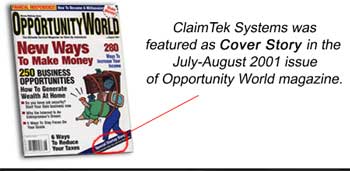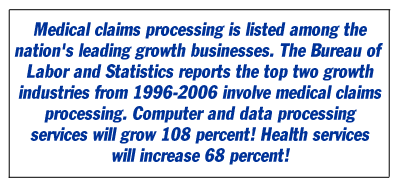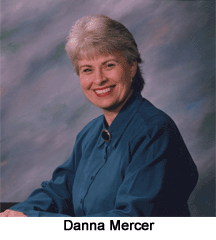ClaimTek In the Press!

Affordable Success:
How ClaimTek Helps the Little Guy Win Big
By Maverick Galloway
Linda Cunningham wanted to spend more time with her children. Marion Cameron changed
careers after relocating. A medical condition forced Danna Mercer to gain more control
over her lifestyle.
More than 18.5 million Americans operate home-based businesses. From more flexible
hours to becoming their own boss to making more money, the excitement of creating
their own destinies has fueled the increasing demand of entrepreneurs investing
in their own futures.
They want to work to live, not live to work. They want the job to work for them,
not slave away at some boring trade they no longer care about doing well.
But how do everyday people break the chains when barely living paycheck to paycheck?
What fuels that leap of faith when starting a business? What's the secret to success?
``Success is a different measure for different people,'' said Nancie Cummins Walls
of Medical Management Billing in San Mateo, Calif. ``Some people just want to put
food on the table, but there's no ceiling to what you can accomplish if you apply
yourself. You just have to decide how big you want to become.''
How high is up? It sounds exciting. The only questions when starting a company are
what level of success you wish and which business best suits you?
Afterall, there are 1,600 franchise businesses from baking cookies to selling pizza.
Own a print shop, install mufflers, fix windshields.
The market is unending. Many of America's billionaires started businesses in their
own homes. Ask Bill Gates about the computers in his garage that led to Microsoft.
Get William Entemann to reveal how his pastry business now in every grocery store
nationwide began in his oven. Discover the secrets of Mrs. Fields (yes, there really
is one) as she went from her kitchen to yours.
The choice is yours, but it's not often a simple one. Many franchises are simply
too expensive for the average American to start. A Jiffy Lube franchise fee is $35,000
plus an estimated $175,000 in startup costs. A Maid Brigade crew needs $43,500 for
supplies. Even a Subway Shop franchise cost $10,000 plus $60,000 for supplies. That's
a lot of dough.
Franchises often come with a 10-year commitment and royalties, leaving you no closer
to spending more time at home. The mounting debt and long hours cause many to fail.
No, you want a business offering flexible hours from your own home with modest startup
costs and unlimited potential.
Welcome to medical claims processing.
Think of the future when considering your next move. What's popular now may be old
news tomorrow. VCR repair looked good for awhile. That is, until it became cheaper
to buy a new one than fix the old one. Finding someone now to fix your VCR (we won't
even talk about Beta) is like finding an honest politician. Same goes for those
smoothy fruit shake stands after everyone discovered how they made you gain weight.

The 60 million baby boomers are now using doctors in record numbers. Claims have
doubled since 1990 to more than 10 billion in 2000.
And electronic claims processing is the cutting edge of the business. More than
30 percent of claims are now processed electronically -- six times more than 1994.
That means there's plenty of room for newcomers to ride the fast-growing technology
wave.
And the money's top dollar for the time involved. Many claims processors can handle
the needs of five doctors. The American Medical Association reports the average
doctor bills more than 440 claims monthly. Many medical claims processors receive
between an average of $3 per transaction or a percentage of the collected value
of the claims.
Doctors want processors who resolve claims quickly and efficiently. The old manual
system that involved mailing forms to the 1,500 health insurance companies can sometimes
take 10 weeks for payment. And that's if nothing goes wrong like a transposed number.
Thirty-seven percent of manual claims are rejected.
Comparatively, electronic claims are paid as quickly as 48 hours. Only one percent
is rejected for mistakes. After all, home-based medical billers aren't interrupted
by phones ringing or patients needs. Doctors know outsourcing their billing, which
is often the last thing office staff worries over given the pressing need to help
patients in a busy, stressful environment, is much more efficient.
But here's the key to any successful startup business – a solid foundation.
You'll need the right software.
You'll need marketing.
You'll need training.
You'll need support.
These are the four cornerstones of success. Missing even one part can cause a business
to crumble.
Software is everything in this computer age. Upgrades are an absolute must.
Marketing shows how to stand out from the crowd.
Training teaches how to be successful from sales to software.
Support means a lifeline whenever needed.
``There's good companies and there's bad companies,'' said Linda Cunningham of Medical
Professional Services in Fairfax Station, Va. ``A lot of bad businesses will make
promises that this is a get-rich-quick business and sell you an outdated $300 software
package that is all you need to be successful. These schemes shed a bad light on
reputable companies like ClaimTek that do stand behind their product.''
ClaimTek Systems, led by President Kyle Farhat, has been consistently named the
best medical claims processing company in the country.
``In my opinion, Kyle Farhat and ClaimTek are the real medical billing specialists
if you are seeking to start a new business,'' said Rick Benzel, author of ``Making
Money in a Health Service Business on your Home-Based PC.'' ``ClaimTek is the only
reliable one around. I can personally attest to the dedication, commitment and expertise
of Kyle Farhat, who is a smart software developer, excellent trainer and savvy consultant.''
What separates ClaimTek from its dozen competitors? Software, marketing, training
and support, say its licensees.
Anyone can sell a $300 outdated piece of software (and many will try) that leaves
buyers virtually no chance of succeeding. ClaimTek is the only one company merging
the four cornerstones of success to provide clients the doorway to opportunities.
``Buying a $300 program is nothing more than buying a broken promise,'' Farhat said.
``If people look into it they'll realize it's nothing more than a scam. These companies
won't provide software demos. They tell stories that aren't true. You're basically
shredding $300.
``It's an incredible industry, but people need to get solid marketing, training,
software and support. Anything short of that is asking for trouble.''
Let's take it one step at a time to explain how each interacts to form a solid company.
First and foremost, software is the key to the business. Anyone who has bought a
computer knows it's obsolete before the box is opened.
That's why having the latest software complete with regular upgrades is absolutely
necessary to successfully deal with the 1,500 insurance carriers nationwide. ClaimTek
has develop its exclusive software called ``MedOffice'' that lets processors directly
interface with computers in the doctors' offices using the standard Lytec Medical
Billing Software so all claims are handled from home offices, but also provides
an additional wide array of services for further revenue.
``Health care claims processing has to go electronic,'' Farhat said. ``You can file
your taxes online. Stock trading is online. This is the future.''
ClaimTek provides 10 software applications for targeted tasks. There's electronic
fund transfer, third-party collections, patient well-care program and remote backup
storage among the more popular programs. Remember, only ClaimTek offers its patented
``MedOffice'' software program.
``It fits together like a glove,'' Farhat said. ``It streamlines daily operations.
Doctors can easily stay in touch and don't feel like they're losing control of their
accounts.''
Said Benzel: ``[MedOffice] allows you to put a sophisticated software program into
the doctor's office that handles medical transcription and certain record keeping
functions while you handle the billing. Many doctors prefer this type of system
since they do not want to abandon having control of their records. ClaimTek helps
you overcome one of the objections doctors have to giving you their business.''
Having the leading software is important, but if Bill Gates didn't know how to spread
the word, Windows would be something you stare through and MacIntosh would be better
known as a computer than an apple. Standout marketing grabs the interest of doctors
within 10 seconds.
ClaimTek's colorful, detailed brochures make busy physicians take a second look.
That's why ClaimTek provides licensees 1,500 pieces of professionally-written marketing
materials that reflect your professionalism.
``The more you look like one-stop shopping, the more you stand out,'' Farhat said.
``Doctors may not need everything you offer today, but they'll grow into it. This
is a decisive factor.''
Training its licensees to conduct presentations to clients is part of ClaimTek's
comprehensive program. After all, you have to look, sound and act professionally
to get the business so ClaimTek concentrates on marketing as much as on the software.
But what clearly separates ClaimTek from other companies is its software training
program that includes one-on-one mentoring. It's 12 hours scheduled to your timetable,
often in 1- or 2-hour increments so you're not overwhelmed. It's conducted over
the phone so there's no travel costs. You'll receive the Medical Coding and Fees
Manual that quickly teaches the use of ICD and CPT codes.
``With a private line to your mentor, you can ask anything you want,'' Farhat said.
``Some people are intimidated during seminars. They're afraid to ask questions for
fear of looking foolish. You just have to know the basics of a Windows program like
opening and moving files.''
Finally, some companies believe the word ``support'' means putting you on hold until
you finally quit. ClaimTek offers unlimited support for two years. Indeed, the Emergency
Support Service provides the ultimate backup capability of handling claims should
an unexpected absence of several weeks arise.
``You can go on vacation. You can get sick. We still have your back,'' Farhat said.
Mercer knows what it's like not to be always be at full strength. A chronic soft
tissue condition is sometimes quite painful sent her searching for a home-based
career that offered flexibility.
``If I'm having a bad day I can rest and then work in the evening,'' Mercer said.
``If I can't sleep I'll work in the middle of the night.''

Mercer revamped her wide-ranging company called Potpourri Business Services in Salem,
Ore. to concentrate on medical billing. The only ``problem'' was limiting herself
to 12 health providers to avoid becoming overwhelmed. Word-of-mouth referrals among
mental health providers quickly built her business.
Mercer didn't have any medical billing experience when starting, though her eclectic
background as an accountant, tax auditor and even dental assistant allows her to
provide physicians a complete service from collections to health care plan analysis.
And to think she came upon ClaimTek by reading of it in ``How to Make Money On Your
PC.''
``I need variety,'' Mercer said. ``I like technical work, but also working with
people and the challenge of ever-changing insurance requirements. This is a wonderful
mix.''
Cunningham was a successful paralegal in suburban Washington, D.C. The money was
good. The job was challenging. But Cunningham lost a child to sudden death syndrome
in 1995. When becoming pregnant with her third child a year later, she decided to
start a home-based business.
``I couldn't leave my children at home after losing a child,'' Cunningham said.
``I had to find a business to run from home. I did a lot of research on the Internet
on home-based businesses and medical billing was a business with unlimited potential.''
Four years later, Cunningham employs four part-timers, grosses more than six figures
annually and is buying a bigger house. Her firm handles six practices, but that's
just the start for the rolling dynamo of energy. She gained the first two clients
by knocking on doors before four more were referred.
``It fits extremely well into my personal life,'' Cunningham said. ``The flexibility
is what I love most. I can do things during the business day with my children and
still be able to tend to business matters. You can work evenings, weekends.''
Cunningham is used to researching. After all, paralegals are the legal eagles of
law libraries. In fact, she turned her final three choices that offered medical
claims
businesses on each other to see which would emerge as the best. When swimming with
sharks, don't try baiting Cunningham. She's the type that will cut up scam artists
for bait.
``I was very apprehensive and wanted to make sure I was getting the best,'' Cunningham
said.
``When I discussed the two companies with the third, I carefully monitored their
reactions. Two of the three companies got very ugly and employed hard-sell tactics,
which turned me off immediately. Kyle Farhat never did. He understood I was considering
his competitors and was confident his company would emerge as the best. It did.''
Cameron moved to Woonsocket, R.I. to be near his daughter, Andrea. Deciding it would
be a fresh start, the 55-year-old decided to leave his career as a private investigator
behind and founded Medical Billing Management in 1999. Now Marion and Andrea combine
for 40 hours weekly handling claims that is a lot easier than working as a private
eye.
``At my age, it's real rewarding to be stationary eight hours a day,'' he joked.
``When you're right in what you do and successfully follow up on claims, it's a
good feeling.''

Cameron was experienced in running a business, but had no medical billing background.
He chose ClaimTek after researching companies for three months.
``The MedOffice software was the first demo I tried, and every time I tried a software
program elsewhere it led me back to MedOffice,'' Cameron said. ``It seemed to be
the most user-friendly. It has everything doctors want. Other programs you buy for
$500 don't do anything more than billing. You're on your own and have to come up
with something yourself. With MedOffice, you just push a button and have every report
needed.''
Showing health care providers all the bells and whistles of MedOffice is what led
Walls to gain 15 clients, 14 of whom were referrals as word quickly spread of this
former insurance agent who could work wonders with numbers. Walls also provides
physicians with a complete monthly analysis of their financial status.
``One of the positives of the business is helping providers make decisions based
on my reports,'' Walls said. ``I can tell them where they're making money and where
they're not and keep them out of trouble with health care plans they're involved
in. It's crucial to stay abreast of troubled health care programs.'' Walls said
ClaimTek's marketing plan was superior to its rivals after trying another company.
``The other company didn't give me the tools I needed. It eventually went under,''
Walls said. ``Kyle Farhat brought a whole new avenue in terms of marketing and provided
assistant to do things I couldn't before. Suddenly, the health care providers could
see everything we could do.''
Perhaps the biggest obstacle when beginning a business for many working people is
the startup capital. Remember those six-figure costs of the previously-mentioned
franchises? Anyone without a trust fund can't afford it. That's probably why some
companies crank out $300 software programs that look like a good deal until the
system locks up the computer and there's no one at tech support.
However, ClaimTek's complete services cost only $7,995. That's for the entire software
with regular upgrades, marketing materials, and personal training and support staff.
There's no add-on costs. No royalties. It's a small investment into your financial
future.
Just ask Cameron, Walls, Cunningham and Mercer.